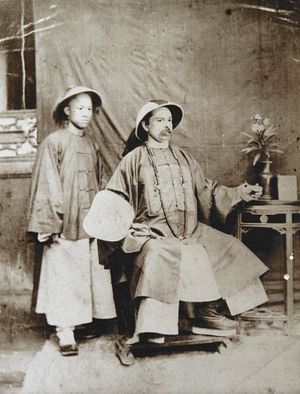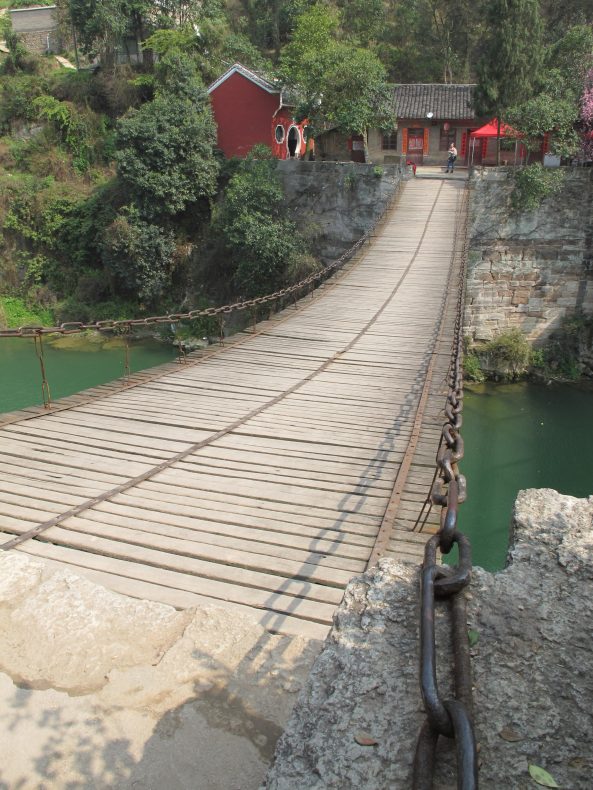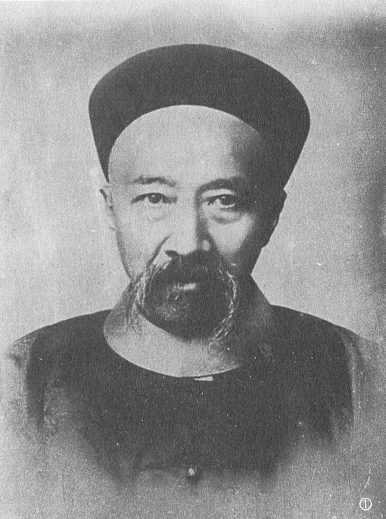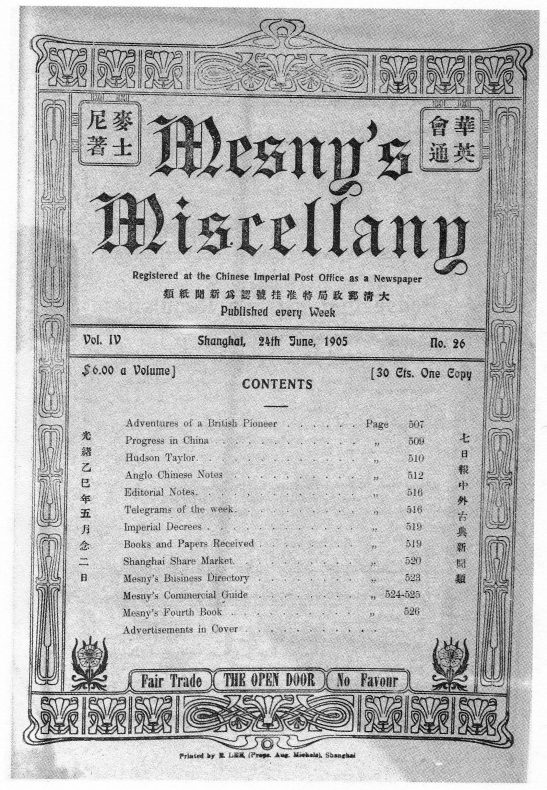In February 1871, Chinese troops entered Guiyang, the capital of Guizhou province, at the end of an exhausting campaign. They had been fighting the Miao ethnic minority, who were in rebellion against the central government: the Chinese had battled them right across Guizhou, enduring starvation rations, infighting amongst their own commanders, long periods under siege, several disastrous ambushes, and moments of unbelievably bloody hand-to-hand fighting.
But now it was Chinese New Year, and Guiyang’s streets were packed with happy, festive throngs setting off firecrackers. Checking in to his temporary quarters at the rear of the Black Sage temple, the newly-appointed Provincial Superintendent of Foreign Arms found the halls packed to the rafters with barrels of gunpowder, took one look at the worshipers lighting sticks of incense and candles, and decided it would be safer to bunk elsewhere. Despite his Chinese robes, whose leopard rank badge and pale blue hat button identified him as a military Mandarin of the third rank, there was something decidedly unusual about this young, thickly-moustached officer: he was British, and his name was William Mesny.
Mesny had been born in October 1842 on the island of Jersey. At the age of eight he was taken out of school and apprenticed to a stonemason, learning to survey and use explosives before becoming a deckhand aboard a ship running supplies to France during the Crimean War. The next five years were spent at sea, traveling between Europe and the Americas, Africa, and Australia, before Mesny finally washed ashore at Shanghai, at 18, in late 1860. He was to spend most of the rest of his life in China.
The China that greeted Mesny was not a happy place. Shanghai was under siege and the country was in chaos, rocked by foreign invasion and civil war. The trouble had begun decades earlier when Britain – then forking out a fortune every year for Chinese silk and tea – decided it would only be fair if China began buying British goods in return. As the Chinese showed no interest in their wool or cotton, the British began to import cheap opium from India instead. Addiction and demand in China soared, and the Imperial coffers emptied alarmingly.
In 1839 Chinese officials stepped in to stop the trade, and Britain declared war to keep it going. For the next 20 years the Opium Wars flared across the land, ending in 1860 with Anglo-French forces storming Beijing. In the aftermath, China was forcibly opened up to foreign trade through “treaty ports,” where foreigners could live and conduct business. Bitter and humiliated at their defeat, Chinese politicians became polarized between xenophobic conservatives, hanging on to the old order, and pragmatic progressives keen to adopt superior Western technologies – especially in warfare.
By now, a weakened Chinese government was also facing internal conflicts. Foremost was the Taiping Uprising, the world’s largest civil war, which left at least 20 million dead and eastern China in ruins. Trade along the Yangtze River, which ran from deep in the interior to the coast near Shanghai, had almost been brought to a halt by the conflict. Mesny, who began his China career as a prison warder in Hong Kong, now found employment as a blockade runner along the Yangtze, captaining vessels smuggling salt and armaments upstream from Shanghai to the inland metropolis of Wuhan.
It proved to be very dangerous work. Having been attacked by pirates and nearly murdered by Imperial troops, Mesny was captured by the Taipings and held hostage for five months. He was well treated – the rebels were losing ground against a combined onslaught of Imperial and British forces, and needed Mesny alive as a bargaining chip – though a bout of malaria nearly finished him off. He eventually managed to smuggle a letter out to the British authorities, who sent a gunboat to rescue him.
By now fluent in Chinese, Mesny tried his luck as a customs inspector, hotelier, and blacksmith, before managing to enlist as an arms instructor with the Chinese military in 1868. He spent the next eight years in Guizhou province, fighting first the Miao and then, after their rebellion was quashed, Muslim insurgents. Rising to the rank of general, Mesny was later put in charge of the provincial armories, married his first Chinese wife, and designed a suspension bridge – still standing – near the town of Chong’an. His spare time was spent writing newspaper articles about his experiences for China’s English-language press.
Mesny eventually grew bored with his settled existence. In 1877 he resigned his post to become an interpreter and trouble-shooter to the explorer (and spy) William Gill, who was travelling westwards across China to Burma and India. The two men spent five months together on the road, experiencing first-hand the effects of the recent rebellions: towns pounded to ruins, infrastructure destroyed, people reduced to poverty. Along the way they tried to enter Tibet, but were turned back on the border by a party of well-armed horsemen. The Tibetans had seen what foreigners had done to China, and were determined to keep them out of their own country.
Aside from it being a physically tough journey, Gill and Mesny made it to Burma unscathed, having pioneered a viable route between central China and British-held territory. Exploring potential trade routes – and avoiding the unpredictable transit taxes levied on commercial goods by the Chinese government – became a major interest of Mesny’s.
Back in Britain, Gill was awarded the Royal Geographical Society medal and published a best-selling book. Mesny found himself ignored – Gill’s book barely mentioned his role – and after just nine months he returned to China in 1878.
Perhaps in an attempt to out-perform Gill, Mesny now began his own epic five-year circuit around China. In a series of newspaper articles he wrote about the rigors of dealing with petty bureaucrats, the terrible state of the roads and inns, his schemes for improving the country’s infrastructure, and a fascinating jumble of local news, legends, culture, and history. He was nearly murdered at one point by a mob, collected several new species of plant (two of which, a willow and a jasmine, were named after him), and frequently fell out with local authorities – something he became all too good at.
Mesny’s travels eventually took him into the hostile deserts of northwestern China, chasing the official Zuo Zongtang, with whom he had been authorized to negotiate a massive loan on behalf of the French government. But on arrival he found that Zuo had been recalled to Beijing, so he decided to follow him. Along the way, Mesny met a first-time provincial governor named Zhang Zhidong, and Li Hongzhang, China’s most powerful statesman. Both offered him official posts and, still restless for adventure in the provinces, Mesny decided to serve with Zhang. It was a fateful decision: being rejected for some unknown minor official greatly offended Li Hongzhang, and his enmity was to blight Mesny’s later career.
Mesny spent almost a year with Zhang Zhidong, formulating a grand modernization project involving mining, telegraphs, and railways. But just as Zhang was poised to implement his schemes, Mesny’s contrary nature took hold and he again set off, heading southwest across China to distant Yunnan province. His travels coincided with the first rumblings of a struggle between France and China over control of Vietnam, which shared a border with Yunnan. Refused permission to cross the border and report on the situation first-hand, Mesny planted some agents amongst the Black Flags, a band of pro-Chinese guerrillas, and then took off once more. He ended his China circuit at Hong Kong in 1883, where he published a book, Tungking, about the origins of what became the Sino-French war.
In 1885, Mesny finally settled down at Shanghai with an 18-year-old concubine – later his second wife – who gave birth to a son and daughter. He stayed in Shanghai for the next three decades, dealing arms, investing in property and losing a lot of money on a roller coaster (closed down by the authorities) and a roller-skating rink (destroyed by a typhoon).
Meanwhile, his former employer Zhang Zhidong was becoming a driving force behind the Self-Strengthening Movement, an attempt to drag China into the modern age by modernizing industry. Zhang adopted many of the schemes that Mesny had proposed earlier, including China’s first modern mint, its first steel foundry, and its first commercial passenger railway. Zhang never credited Mesny as being the inspiration behind these ground-breaking projects, and Mesny never forgave him.
In the background, hostility toward foreign interference in the country began to erupt in outright violence against Westerners, culminating in the Boxer Rebellion of 1900. During the build-up, one of Mesny’s associates – a British customs official named Charles Welsh Mason – was caught smuggling arms to a rebel group held responsible for some of the attacks. Mesny’s role in the affair was trivial, but Li Hongzhang used the connection to accuse him of being a traitor. Mesny’s Chinese associates stopped dealing with him and he swiftly went bankrupt.
Partly to restore his reputation, between 1895 and 1905 Mesny published a magazine, Mesny’s Chinese Miscellany, a compendium of everything he knew about China. Later bound together in four volumes, it amounted to 2,000 pages of utterly random entries on everything from military ranks and weapons to food, marriage customs, folklore, biographies of important Chinese, and of course his hobby horses of mining, trade routes, and railways. Also included were exciting excerpts of his adventures, covering the first 15 years of his time in China.
Despite getting excellent reviews in the press, Mesny’s Chinese Miscellany was a financial failure; after a fractious marriage his wife also left him, taking his remaining property as settlement. When Mesny died in 1919, aged 77, he was making ends meet as a desk clerk.
Mesny left behind an impressive record of a long and active life in China. Yet he earned very little reward after abandoning his military post in Guizhou to follow Gill in 1877. While it’s true that this allowed him to become a great traveler, travel was both his strength and his weakness: without it he would have never have acquired his specialist knowledge of Chinese landscape, language ,and life, and so have had nothing to write about; with it, he was too restless to forge the lasting official contacts that allowed many of his foreign contemporaries in China to carve out successful careers for themselves.
By the time he finally settled in Shanghai, he had spent too long out of European society to ever fully fit back in, what with a Chinese mistress and two mixed-race children. The loss of reputation amongst his Chinese connections following the Mason debacle must have been a bitter blow.
Mesny surely deserves a large amount of credit for nurturing Zhang Zhidong’s leading role in China’s 19th-century modernizations, even if it was Zhang’s own drive and initiative that got things done. Perhaps if events had worked out differently, then today’s captains of heavy industry in China might look back to Zhang Zhidong as their founding father and Mesny, as the man who inspired him, could have claimed a significant place in Chinese history.
David Leffman is a British photographer and travel writer who first visited China in 1985 and has been back many times since. His biography of William Mesny, The Mercenary Mandarin, was published by Blacksmith Books (Hong Kong) in 2016. For more information, see www.davidleffman.com




































